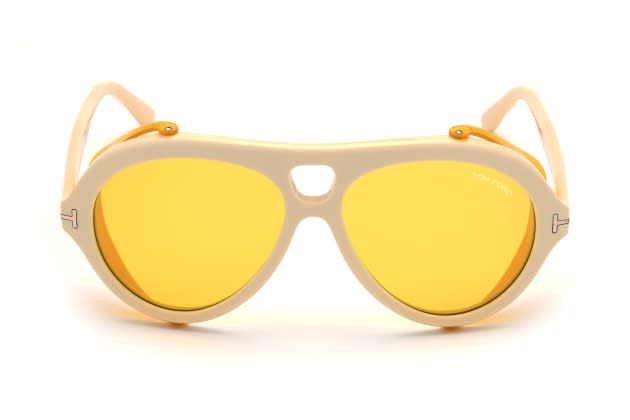Marcolin Q1 Sales, Profitability Grow

MILAN — Marcolin Group has started the year on a strong footing, with revenues rising 17.3 percent in the first quarter, and the closing last week of a perpetual license with The Estée Lauder Cos. for Tom Ford eyewear, a historic agreement for the Italian eyewear manufacturer.
This is a significant extension of the company’s license with the American designer’s brand, whose eyewear Marcolin has manufactured and distributed since 2005.
More from WWD
The Estée Lauder Cos. in November said it was acquiring the Tom Ford business for about $2.3 billion, net of a $250 million payment to Lauder at closing from Marcolin through available cash. Upon the closing of the deal last week, Marcolin revealed on its website that it had raised a capital increase of 75 million euros.
On Friday, Estée Lauder appointed Guillaume Jesel president and chief executive officer of Tom Ford, while Peter Hawkings has been tapped as creative director, as reported. Ermenegildo Zegna Group holds Tom Ford’s fashion license as part of Estée Lauder’s deal.
Marcolin on Thursday reported that adjusted sales in the three months ended March 31, excluding extraordinary costs, totaled 152.3 million euros compared with adjusted sales of 129.8 million euros in the same period last year.
Adjusted earnings before interest, taxes, depreciation and amortization climbed 30 percent to 23.7 million euros compared with 18.2 million euros in the first three months of 2022, with a margin of 15.5 percent versus 14 percent last year.
Adjusted operating profit totaled 17.1 million euros compared with 11.8 million euros last year.
All markets contributed to the growth. Revenues in Asia jumped 134.2 percent to 11 million euros. Sales in the Europe, Middle East and Africa region rose 15.5 percent to 76.5 million euros, and in the Americas they were up 8.1 percent to 57.9 million euros. Revenues in the rest of the world amounted to 7 million euros, climbing 30.6 percent.
As reported, last year Marcolin sales rose 20.1 percent to 547.4 million euros compared with 455.6 million euros in 2021.
The strong results were attributed to several factors, including the consolidation of the brands in the portfolio, the implementation of a customer-centric digital transformation and the continuous push toward production and procurement efficiency.
Founded in 1961 in Longarone, in Italy’s key eyewear manufacturing district, in addition to its own web proprietary brand, Marcolin counts licenses for brands ranging from Adidas, Moncler and Max Mara to Tod’s, Zegna, Timberland, Bally and Pucci to name a few.
Through its own direct network and global partners, Marcolin distributes its products in more than 125 countries. At the end of 2022, the group counted about 2,000 employees.
In March, Marcolin named Lara Marogna group style and product development director, reporting to CEO Fabrizio Curci, with the goal to “maximize the potential of the brands in the various segments.” Marogna joined Marcolin in 2011 and succeeded Alessandro Beccarini.
Curci joined Marcolin Group in June 2020 in the middle of the pandemic, succeeding Massimo Renon.
Leading European private equity firm PAI Partners acquired a majority stake in Marcolin in 2012 from a number of investors who included the Marcolin family and brothers Diego and Andrea Della Valle, and delisted the company. PAI’s vision is understood to be long term.
At the end of 2021, LVMH Moët Hennessy Louis Vuitton took full control of eyewear manufacturer Thélios, purchasing Marcolin’s 49 percent stake in the company. Thélios began operating in 2018, a joint venture between LVMH, which at the time had a 51 percent stake, with Marcolin owning the remainder. When the agreement was revealed, LVMH bought a 10 percent stake in Marcolin, which the latter has bought back.
Thélios produces for Dior, Fendi, Celine, Loewe, Stella McCartney and Givenchy, among others.
Best of WWD

